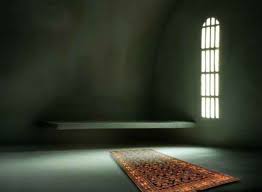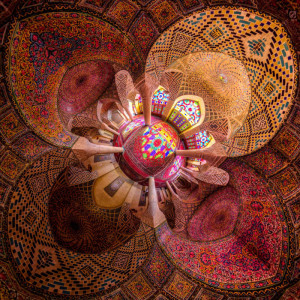Death: Everyone who lives in this world has to die at his appointed time, whether he is amongst the pious or wicked. Allah says in the Qur’aan: “Every soul shall taste death.”[1] And, “We did not grant to any human immortality before you (O Muhammad (sallallahu alaihi wa-sallam)) then if you die, would they live for ever.”[2]
Soul: Soul is a creation (Makhlooq) of Allah. It remains in contact with the body throughout the worldly life and causes the body to have life. Death occurs when the soul departs. Allah says about the soul in the Qur’aan: “They ask you concerning the soul. Say that the soul is from Allah and you have not been given knowledge of it except a little.”[3]
Is the Soul of Allah’s Messenger (sallallahu alaihi wa-sallam) present everywhere?
Some believe that the soul of Allah’s Messenger (sallallahu alaihi wa-sallam) is omnipresent. Mulla Alee Qaree, a famous Hanafee theologian says, “… the Ruh (spirit) of Rasoolullah is present in the house of every Muslim.”[4]
This is an erroneous view because the abode of righteous souls after death is Paradise, as mentioned in the following Ahaadeeth,
Ka’ab Ibn Malik related that the Messenger of Allah (sallallahu alaihi wa-sallam) said: “The believer’s soul is a bird which feeds upon the fruits of the trees of Paradise, until Allah returns it to its body on the Day he is Resurrected.”[5]
Narrated Anas (radhi allahu anhu), when the ailment of the Prophet (sallallahu alaihi wa-sallam) got aggravated, he became unconscious, whereupon Fatima said, “Oh, how distressed my father is!” He said, “Your father will have no more distress after today.” When he expired, she said, “O Father! Who has responded to the call of the Lord Who has invited him! O Father, whose dwelling place is the Garden of Paradise (i.e. Al-Firdaus)! O Father! We convey this news (of your death) to Jibreel.” When he was buried, Fatima said, “O Anas! Do you feel pleased to throw earth over Allah’s Messenger (sallallahu alaihi wa-sallam)?”[6]
Grave: Grave is the abode of the body after death, the Messenger of Allah (sallallahu alaihi wa-sallam) said: “Verily the grave is the first step in the stages of the Hereafter; if one finds salvation (at this stage) the succeeding (stages) become easy for him, and if he does not find salvation in it, what follows this stage is very hard upon him.”[7] The bodies of common people decay in their graves with the passage of time, whilst the bodies of the Prophets (alaihi as-salaam) are preserved as a sign of honor. It is also known by observation that bodies of some martyrs are preserved.
Barzakh: Linguistically, “Barzakh” means a veil, barrier or partition between two things. Ibn Abbas (radhi allahu anhu) defines Barzakh as, a Hijab (a partition of veil). Adh-Dhahhak (a Tab’ieen scholar of Tafseer) says: ‘Barzakh is the stage between this world and the Hereafter.’[8] Al-Qurtubi, in his exposition on these various interpretations states: ‘The Barzakh is a barrier between two things. It is the stage between this world and the other world – from the time of death until the time of Resurrection. Thus, whoever dies enters the Barzakh”[9] All these various explanations point to one underlined fact, that the soul after having separated from its worldly body, enters into a realm behind which there is a barrier forbidding any return
Can the dead hear the living
The Prophet (peace be upon him) is alive in his grave but not in the manner that some ignorant people believe.
It is a special type of life, which scholars call the barzakh. He is experiencing the best possible life in the barzakh, but that does not mean that his life is similar to the one that he had experienced before death.
He had already died and he does not experience anything of our world except what Allah wants him to know of it, such as the greetings and salutations of his followers.
Generally, people who have died do not hear those who talk to them.
However, our Prophet (peace be upon him) informed us that it is possible. He said ’Whoever passes by the grave of his brother, or friend, whom he met him before in life and greeted him, then Allah will return the soul to the deceased person to answer back the greeting“. So, we say it is possible in the limited number of cases cited by the Prophet (peace be upon him).
==============================================
[1] Soorah al-Imran (3): 185.
[2] Soorah al-Ambiya (21): 34.
[3] Soorah al-Isra (17): 85.
Many Soofis hold the incorrect belief that soul is a part of Allah. “Abu Bakr al-Kalabadhi mentions, “It (the soul) never entered under the humiliation of ‘Be’ … (the soul’s) only function is to produce life and being alive, as well as producing life, is the attribute of Him, Who causes life, just as shaping and creating are an attribute of the Creator. [The Doctrine of the Soofis (Kitab al-Ta’arruf li-madhhab ahl al-Tasawwuf) (Eng. Trans.) p.50-51]
This argument is false, since the soul does not produce life on its own, it is only a creation of Allah and comparing the creation to the Creator is falsehood.
[4] Naseem ar-Riyadh fee Sharah Shifaa Qadee Iyaaz, vol. 3, p.464.
[5] Collected by an-Nasa’ee, Ibn Majah and Malik and authenticated by Shaikh al-Albanee in Sharh al-Aqeedah at-Tahaawiyyah, p.455, and footnote no. 1.
[6] Saheeh al-Bukharee vol. 5, no. 739.
[7] Collected in at-Tirmidhee (no. 132) and Ibn Majah.
[8] See al-Qurtubi’s Tafseer, vol.12, p.150.
[9] See al-Qurtubi’s Tafseer, vol.12, p.150.


